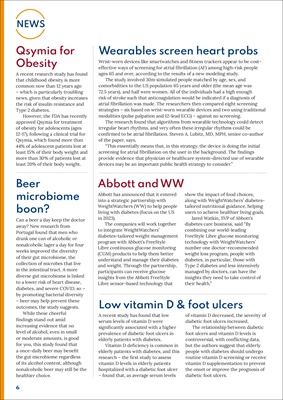
6
NEWS
Qsymia for
Obesity
A recent research study has found
that childhood obesity is more
common now than 12 years ago
- which is particularly troubling
news, given that obesity increases
the risk of insulin resistance and
Type 2 diabetes.
However, the FDA has recently
approved Qsymia for treatment
of obesity for adolescents (ages
12-17), following a clinical trial for
Qsymia, which found more than
44% of adolescent patients lost at
least 15% of their body weight and
more than 30% of patients lost at
least 20% of their body weight.
Wearables screen heart probs
Wrist-worn devices like smartwatches and fitness trackers appear to be costeffective
ways of screening for atrial fibrillation (AF) among high-risk people
ages 65 and over, according to the results of a new modeling study.
The study involved 30m simulated people matched by age, sex, and
comorbidities to the US population 65 years and older (the mean age was
72.5 years), and half were women. All of the individuals had a high enough
risk of stroke such that anticoagulation would be indicated if a diagnosis of
atrial fibrillation was made. The researchers then compared eight screening
strategies - six based on wrist-worn wearable devices and two using traditional
modalities (pulse palpation and 12-lead ECG) - against no screening.
The research found that algorithms from wearable technology could detect
irregular heart rhythms, and very often these irregular rhythms could be
confirmed to be atrial fibrillation. Steven A. Lubitz, MD, MPH, senior co-author
of the paper, says,
"This essentially means that, in this strategy, the device is doing the initial
screening for atrial fibrillation on the user in the background. The findings
provide evidence that physician or healthcare system-directed use of wearable
devices may be an important public health strategy to consider."
Abbott and WW
Abbott has announced that it entered
into a strategic partnership with
WeightWatchers (WW) to help people
living with diabetes (focus on the US
in 2023).
The companies will work together
to integrate WeightWatchers'
diabetes-tailored weight management
program with Abbott's FreeStyle
Libre continuous glucose monitoring
(CGM) products to help them better
understand and manage their diabetes
and weight. Through the partnership,
participants can receive glucose
insights from the Abbott FreeStyle
Libre sensor-based technology that
show the impact of food choices,
along with WeightWatchers' diabetestailored
nutritional guidance, helping
users to achieve healthier living goals.
Jared Watkin, SVP of Abbott's
diabetes care business, said "By
combining our world-leading
FreeStyle Libre glucose monitoring
technology with WeightWatchers'
number one doctor-recommended
weight loss program, people with
diabetes, in particular, those with
Type 2 diabetes and less intensively
managed by doctors, can have the
insights they need to take control of
their health."
Beer
microbiome
boon?
Can a beer a day keep the doctor
away? New research from
Portugal found that men who
drank one can of alcoholic or
nonalcoholic lager a day for four
weeks improved the diversity
of their gut microbiome, the
collection of microbes that live
in the intestinal tract. A more
diverse gut microbiome is linked
to a lower risk of heart disease,
diabetes, and severe COVID, so -
by promoting bacterial diversity
- beer may help prevent these
outcomes, the study suggests.
While these cheerful
findings stand out amid
increasing evidence that no
level of alcohol, even in small
or moderate amounts, is good
for you, this study found that
a once-daily beer may benefit
the gut microbiome regardless
of its alcohol content, although
nonalcoholic beer may still be the
healthier choice.
Low vitamin D & foot ulcers
A recent study has found that low
serum levels of vitamin D were
significantly associated with a higher
prevalence of diabetic foot ulcers in
elderly patients with diabetes.
Vitamin D deficiency is common in
elderly patients with diabetes, and this
research - the first study to assess
vitamin D levels in elderly patients
hospitalized with a diabetic foot ulcer
- found that, as average serum levels
of vitamin D decreased, the severity of
diabetic foot ulcers increased.
The relationship between diabetic
foot ulcers and vitamin D levels is
controversial, with conflicting data,
but the authors suggest that elderly
people with diabetes should undergo
routine vitamin D screening or receive
vitamin D supplementation to prevent
the onset or improve the prognosis of
diabetic foot ulcers.